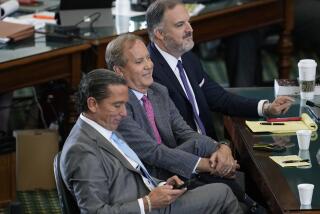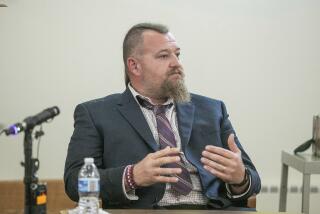Jurors Say They Felt North Was Just Obeying Superiors
- Share via
WASHINGTON — In voting to acquit Oliver L. North of nine of the 12 felony charges against him, the jury accepted the former White House aide’s explanation that he was merely obeying his superiors and did not know he was breaking the law, jurors said in interviews Friday.
Only on the three charges in which North himself admitted greatest responsibility could the jury agree to convict him--a consensus secured only after a majority were able to overcome staunch opposition from three holdouts who wanted to acquit North on all charges, according to three extensive juror accounts.
“They felt that he was just following orders even then,” copy machine operator Tara King said of the three who favored complete acquittal. The contentious deadlock was broken only Thursday afternoon when the holdouts relented.
The revealing accounts Friday by the jurors--who had deliberated the Iran-Contra case for 12 days before returning their verdict--included strong expressions of suspicion about the actions of top White House officials over North. They speculated that North had been manipulated by people who had the “power to move things,” as foreman Denise Anderson put it.
“One man can run no show the way that (one) was being run,” Anderson said of the secret support operations for the Nicaraguan rebels.
That sentiment could bode ill for former National Security Adviser John M. Poindexter, one of those superiors, when his criminal case is presented to a Washington jury this fall.
The higher-ups apparently convinced North “that you can do it and nothing will happen,” said juror King. “It won’t cause a big conflict if you do it.”
“We felt sometimes that he was pushed a little too far out there by himself,” said a third juror, unemployed security guard Earl Williams.
The accounts indicate that the jurors disregarded one key admonition from U.S. District Judge Gerhard A. Gesell--that merely receiving orders from above would not absolve North of guilt under the law. They indicated they moved quickly beyond the question of whether North had violated the law and focused on whether he knew he was committing a crime.
Their remarks clearly illustrate the effectiveness of the defense strategy adopted by North’s lawyers, who created empathy toward their client through frequent references to his role as loyal subordinate to the nation’s most powerful political figures.
“He was working in the White House, a position that the country holds dear,” noted Ronald Allen, a professor at Northwestern University’s law school.
“When one is working in an institution of importance and serves interests we respect and says he’s trying to do his job, there is a way to see how he was not being culpable for what he did,” Allen said. “A jury could be sympathetic to him.”
“They’ve all been employees under bosses and know the situation,” said another legal expert, Paul Rothstein of Georgetown University Law School. “I think that came through loud and clear.”
Indeed, jury foreman Anderson drew a specific parallel between her own experience and that of North, who was accused of obstructing Congress because he drafted letters on behalf of his superior, then-National Security Adviser Robert C. McFarlane, that he knew to contain falsehoods.
“All the jobs I have ever had, I have written letters for my boss,” Anderson said. “They may ask me for my input, and I give it. I don’t sign the letter, so why should I go to jail for a letter?”
Of six charges alleging wrongdoing in North’s dealings with Congress, the jury voted to convict the former Marine on only a single, subsidiary charge of “aiding and abetting” the obstruction of Congress by preparing a false chronology in November, 1986. The document falsely described the secret arms shipments to Iran that engulfed the Administration of President Ronald Reagan in controversy.
The conviction on that count was a compromise between one group of jurors--who believed North was also guilty of another charge of making false statements to Congress--and another group that regarded him as innocent, juror King said in an extensive interview in the living room of her Washington home.
The jury also found North guilty of destroying government documents detailing his involvement in the covert operation, and of accepting a $13,800 home security system from one of the principal figures.
As a basis for those guilty findings, jurors concluded that in each case, he “said and admitted that he knew (what he did) was against the law,” King said.
In his dramatic testimony from the witness stand, North acknowledged that he had assisted in the preparation of the false chronology, but he said McFarlane had been principally responsible for it.
He acknowledged also that he been responsible for shredding and altering documents but said he believed he had the right to destroy his own and McFarlane’s papers. On the security system, he acknowledged he had made a mistake in drafting phony invoices to conceal that it was a gift.
More to Read
Sign up for Essential California
The most important California stories and recommendations in your inbox every morning.
You may occasionally receive promotional content from the Los Angeles Times.













